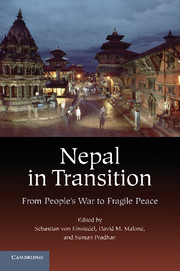Book contents
- Frontmatter
- Contents
- Contributors
- Acknowledgments
- 1 Introduction
- The Context
- Critical Transition and the Role of Outsiders
- 6 Nepal's Masala Peacemaking
- 7 A Comprehensive Peace? Lessons from Human Rights Monitoring in Nepal
- 8 The United Nations and Support to Nepal's Peace Process: The Role of the UN Mission in Nepal
- 9 The 2008 Constituent Assembly Election: Social Inclusion for Peace
- 10 Revolution by Other Means: The Transformation of Nepal's Maoists in a Time of Peace
- Regional Dynamics
- Conclusions
- Index
- References
7 - A Comprehensive Peace? Lessons from Human Rights Monitoring in Nepal
Published online by Cambridge University Press: 05 April 2012
- Frontmatter
- Contents
- Contributors
- Acknowledgments
- 1 Introduction
- The Context
- Critical Transition and the Role of Outsiders
- 6 Nepal's Masala Peacemaking
- 7 A Comprehensive Peace? Lessons from Human Rights Monitoring in Nepal
- 8 The United Nations and Support to Nepal's Peace Process: The Role of the UN Mission in Nepal
- 9 The 2008 Constituent Assembly Election: Social Inclusion for Peace
- 10 Revolution by Other Means: The Transformation of Nepal's Maoists in a Time of Peace
- Regional Dynamics
- Conclusions
- Index
- References
Summary
Introduction
The Maoist insurgency in Nepal took place over a decade during which human rights discourse was growing in influence at the international level. When the conflict began in the mid-1990s, the Office of the United Nations High Commissioner for Human Rights (OHCHR) had only just been created, and Nepal's troubles attracted little international attention. By the end of 2005, Nepal had become host to one of the largest UN human rights field operations in the world, and human rights issues had come to play a central role in national political discourse about the conflict. International monitoring and advocacy helped reduce violence and create space for national actors to push a human rights and pro-democracy agenda culminating in the April 2006 People's Movement.
However, after the signing of the November 2006 Comprehensive Peace Agreement (CPA), human rights seemed to lose their centrality as attention shifted to the complexities of postconflict politics. Little progress was made in addressing the inequality, systemic corruption, and weak rule of law to which the insurgency was largely a response, despite most of the main political actors’ public commitments to uphold human rights and end impunity. As human rights advocates and victims’ groups adjusted their focus from the prevention of civilian casualties to these root causes, their demands for accountability and change appeared to fall on deaf ears. A range of political actors – including some who supported a robust international presence during the conflict – began to attack international monitoring as a form of interference in sovereign affairs and to make claims that the national human rights agenda was being driven by interests outside Nepal.
- Type
- Chapter
- Information
- Nepal in TransitionFrom People's War to Fragile Peace, pp. 175 - 200Publisher: Cambridge University PressPrint publication year: 2012
References
- 9
- Cited by



